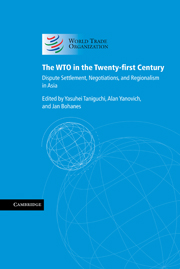Book contents
- Frontmatter
- Contents
- Notes on contributors
- Acknowledgements
- Table of dispute settlement cases and reports
- List of abbreviations
- Introduction
- PART I The WTO at Ten
- PART II Accomplishments and Future Prospects of the WTO Dispute Settlement System
- 3 The WTO dispute settlement system after ten years: the first decade's promises and challenges
- 4 WTO dispute settlement practice 1995–2005: lessons from the past and future challenges
- 5 Evaluating WTO dispute settlement: what results have been achieved through consultations and implementation of panel reports?
- 6 The responsibilities of a WTO Member found to have violated WTO law
- 7 ‘Public–private partnerships’ in WTO dispute settlement: the US and EU experience
- 8 Accomplishments of the WTO dispute settlement mechanism
- 9 Arbitration as an alternative to litigation in the WTO: observations in the light of the 2005 banana tariff arbitrations
- 10 The evolving WTO dispute settlement system
- PART III Asian Perspectives on WTO Dispute Settlement
- PART IV The Doha Development Agenda and Beyond
- PART V Asian Regional Integration and the Multilateral Trading System
- Index
5 - Evaluating WTO dispute settlement: what results have been achieved through consultations and implementation of panel reports?
from PART II - Accomplishments and Future Prospects of the WTO Dispute Settlement System
Published online by Cambridge University Press: 05 March 2012
- Frontmatter
- Contents
- Notes on contributors
- Acknowledgements
- Table of dispute settlement cases and reports
- List of abbreviations
- Introduction
- PART I The WTO at Ten
- PART II Accomplishments and Future Prospects of the WTO Dispute Settlement System
- 3 The WTO dispute settlement system after ten years: the first decade's promises and challenges
- 4 WTO dispute settlement practice 1995–2005: lessons from the past and future challenges
- 5 Evaluating WTO dispute settlement: what results have been achieved through consultations and implementation of panel reports?
- 6 The responsibilities of a WTO Member found to have violated WTO law
- 7 ‘Public–private partnerships’ in WTO dispute settlement: the US and EU experience
- 8 Accomplishments of the WTO dispute settlement mechanism
- 9 Arbitration as an alternative to litigation in the WTO: observations in the light of the 2005 banana tariff arbitrations
- 10 The evolving WTO dispute settlement system
- PART III Asian Perspectives on WTO Dispute Settlement
- PART IV The Doha Development Agenda and Beyond
- PART V Asian Regional Integration and the Multilateral Trading System
- Index
Summary
This chapter examines the operation and accomplishments of two understudied aspects of the World Trade Organization (WTO) dispute settlement system – the consultation process and the implementation results. After a brief summary of the operation of the WTO dispute settlement system – focusing on consultations and the implementation process – it examines in detail the results of consultations and the record on implementation. As part of that examination, it looks at proposals on consultations and implementation that have been made over the years in the ongoing dispute settlement reform negotiations.
Brief overview of the WTO dispute settlement process
An effective dispute settlement system is critical to the operation of the WTO. In the words of the Understanding on the Rules and Procedures Governing the Settlement of Disputes (DSU), it ‘is a central element in providing security and predictability to the multilateral trading system’. There are essentially four phases in the WTO dispute settlement process: consultations, the panel process, the appellate process and surveillance of implementation.
The first step in the process is consultations. A WTO Member may ask for consultations with another Member if the complaining Member believes that the other Member has violated a WTO agreement or otherwise nullified or impaired benefits accruing to it. The goal of the consultation stage is to enable the disputing parties to understand better the factual situation and the legal claims in respect of the dispute and to resolve the matter without further proceedings.
- Type
- Chapter
- Information
- The WTO in the Twenty-first CenturyDispute Settlement, Negotiations, and Regionalism in Asia, pp. 98 - 140Publisher: Cambridge University PressPrint publication year: 2007
- 6
- Cited by



